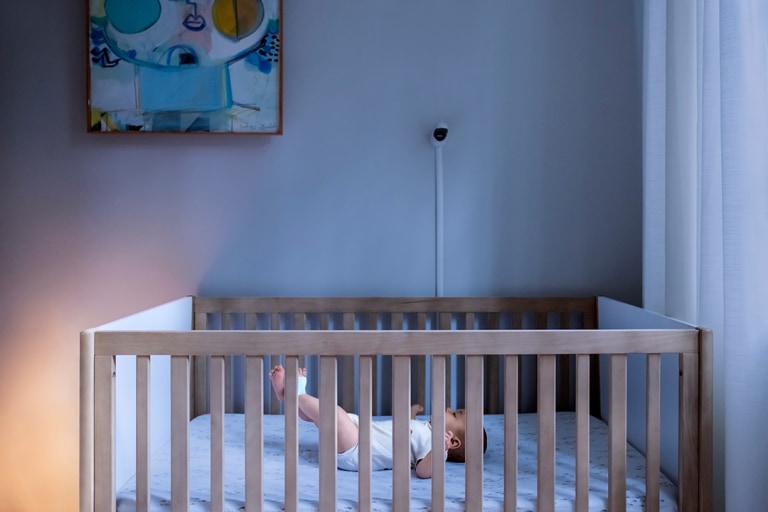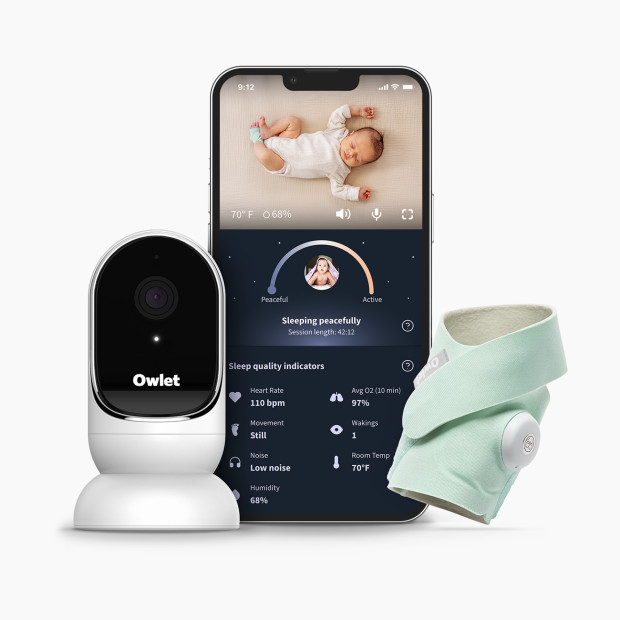
6 Hacks to Help You Get Better Sleep with a Newborn
There’s a lot more to it than just sleeping when the baby sleeps.

By Babylist Staff
Talk to any expectant or new parent about their biggest baby concerns, and sleep is bound to come up. It’s so complicated. Newborns sleep a lot, but not necessarily when—or how—you want them to. Which can make it challenging for you to get the rest you need.
While some sleep struggles are guaranteed—your baby will most likely wake you up for a midnight snack every two to three hours in the beginning—there are a few tips and tricks to help you get better sleep in those moments when your baby is peacefully off in dreamland. And we’ve partnered up with Owlet to share them.
Know Your (Sleepless) Self
Some people handle sleep deprivation better than others. It doesn’t make you a subpar parent if your partner is on their A-game after two hours of sleep and you can barely walk in a straight line. If you know that lack of sleep has a particularly strong impact on your ability to function, try to consider that in your new parent plans.
Maybe that means looking at feeding options that can be shared with a partner (like pumped breastmilk or formula). Maybe it means asking a family member to come over one night a week or adding night nurse or postpartum doula services to your registry. Or it could be as simple as setting yourself up with a sleep routine early on so baby can get into a sleep rhythm as they grow (more on that in a minute). Whatever the solution, working it into your plans before the baby comes means less troubleshooting when you’re in the thick of it.
Track Their Sleep
Figuring out your baby’s sleep rhythm can also help you figure out yours. Aka if you know your baby wakes up every night at 2 a.m., you can plan accordingly. But trying to solve the Rubik’s cube of your baby’s sleep routine while you’re also sleep deprived is like trying to do calculus without any formulas (hint: not easy).
A smart monitor like the Owlet Dream Duo steps in to help do some of the work for you. Whenever your baby goes down for a nap or nighttime snooze, you place a soft, wearable sock on their foot that tracks Sleep Quality Indicators like heart rate, oxygen level and total hours slept.
The Dream Sock will ping the Owlet Dream App on your phone with in-the-moment prompts letting you know if baby is uncomfortable, having trouble falling asleep, or if they need your attention. And, of course, you can check in on them like you would with a regular baby monitor, since the Owlet Cam streams HD video right to your phone.
Each morning, you’ll get an automatic sleep report that details how long your baby slept, how often they woke up and what kind of quality sleep they got. As you continue using Owlet, that kind of information can help you figure out the best times to put your baby down, and during which stretches they sleep the longest.
Once your baby hits the four-month mark, you can also start taking advantage of Owlet’s digital sleep coaching. It gives you an in-depth assessment of your baby’s sleep and then tailors a sleep training plan specifically to their needs, with personalized daily guides that teach you how to help your baby get better rest.
Treat Yourself Like a Baby
Your baby’s sleep routine can’t do you any good if you don’t have a good sleep routine yourself. While early parenthood is not the time to punish yourself with strict rules (get through the day however you need to) try to think of yourself as a very mature baby whose body needs cues to fall asleep too.
For starters, try to move around a little bit during the day (a walk around the block counts) and steer clear of caffeine late in the afternoon. Then, try to stick with a regular bedtime (to the best of your ability) and give yourself a soothing pre-bed ritual. It doesn’t have to be fancy—wash your face, brush your teeth, put on a calming lotion and read a few pages of your favorite book. Just like your baby, rituals can help signal to your body that it’s time to sleep.
Keep Them Close
It can be awfully frustrating when your baby falls back asleep after a 3 a.m. feeding and your body has decided it’s wide awake, thanks to the trek from your room to your baby’s room.
According to the American Association of Pediatrics, room sharing (when your baby’s crib or bassinet is in your bedroom) can have major safety benefits, like reducing the risk of SIDS by up to 50%. But there’s another upside to keeping your baby close by—quicker feeding and soothing. If you’re breastfeeding and use a bedside crib, you can pick up your baby and feed them without actually having to get up out of bed, avoiding the “my body is vertical, so now I am awake” phenomenon. Which may help you fall back asleep a little faster.
But Also Keep Your Distance
The downside to room sharing is that babies make all kinds of unexplained noises while they sleep—grunts and coos and gurgles. And when you’re a new parent, those noises (no matter how quiet) can sound like an alarm bell ringing. So if you have a partner or family member taking a midnight feeding session, go completely off duty. Get yourself a nice pair of ear plugs or take a shift on the couch to avoid unintentional (and unnecessary) wakings and stretch those zzzs to the max.
Sleep When the Baby Sleeps
Just kidding. Every new parent knows that “sleep when the baby sleeps” is easier said than done (you can’t exactly fall asleep when your baby conks out in the stroller or their carrier). But there is some wisdom in that old adage. While it can be tempting to use your baby’s naptime to do the dishes and fold the laundry, the first few weeks of parenthood are a prime time for lowering your standards—especially if you have a sleeper who hasn’t figured out their days and nights yet and only sleeps between the hours of 10 a.m. and 8 p.m. That might mean eating off paper plates one or two nights a week or stocking up on extra outfits for baby so you can rotate laundry a little less often and use those precious daytime snoozes to get a nap yourself.
Not normally a daytime sleeper? (Not everyone can easily drift off at lunchtime!) Remember what we said about treating yourself like a baby: get blackout curtains for your living room or bedroom, turn up the white noise machine, employ the use of an eye mask and trick your body into thinking it’s nighttime.
Even taking all these steps, sleepless nights are somewhat unavoidable in the early stages of parenthood. Cliche as it may sound, one of the best things you can do during this time is to give yourself permission to be exhausted, rest whenever you can and remember that this stage will pass. Your morning coffee also helps.
This article is sponsored by Owlet. Babylist’s free site, apps and emails are made possible by our sponsors. We limit our sponsored content to relevant partners that offer products and services we believe in and use ourselves.
